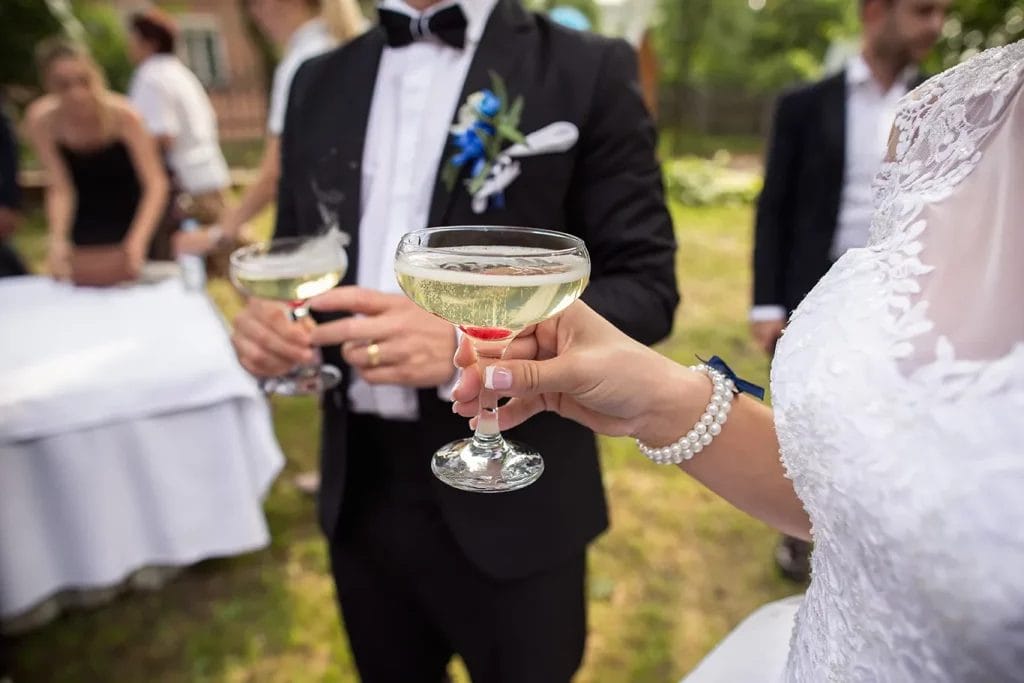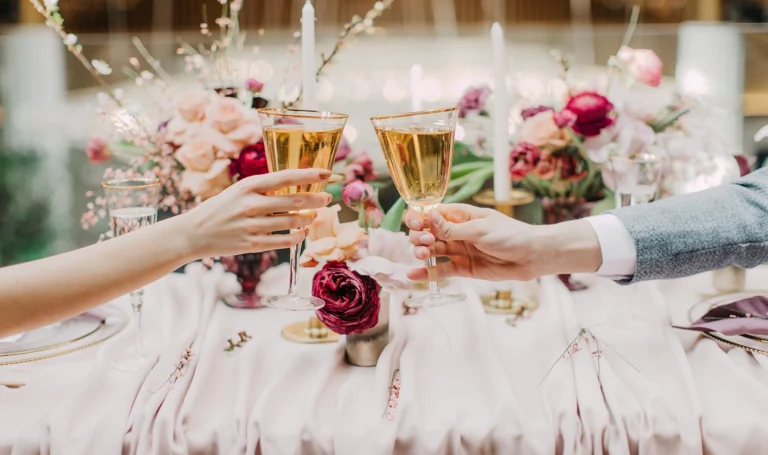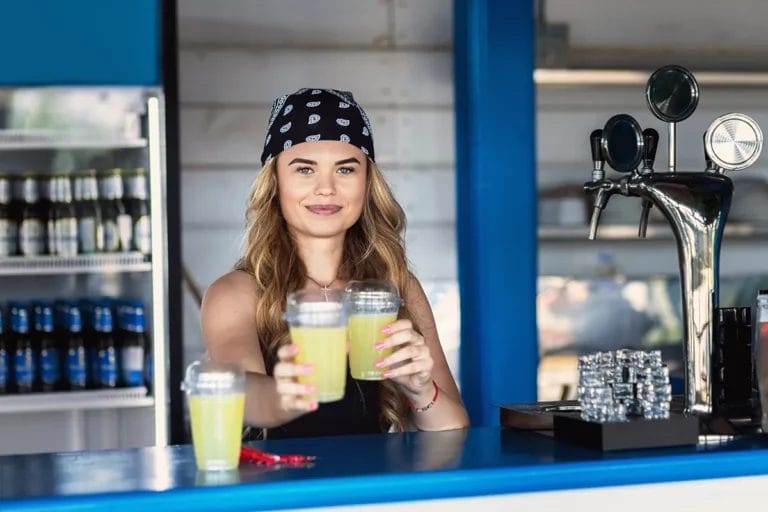The typical price range for a wedding bartender is $480–$1,200 for an event with 100–150 guests where the bartender is not providing the liquor. However, that can vary greatly from one wedding to the next. Wedding bartender prices are generally dependent on four factors:
- The number of guests in attendance
- The number of hours spent working
- What drinks will be offered (beer and wine, cocktails, etc.)
- What you will provide (service only, service and alcohol, add-on services such as champagne toasts, etc.)
To help you determine how to price your wedding bartending services, we’re breaking down everything you need to consider to offer the most profitable and competitive price into a step-by-step guide. Read on and take the next step in your wedding bartending journey!
How to Price Your Wedding Bartender Services in 6 Steps
1. Calculate Your Costs
The very first thing you should do before setting your prices is to accurately calculate and account for your costs. This includes expenses like:
- Liquor
- Mixers
- Garnishes
- Glassware
- Station supplies (e.g., cocktail napkins, stirrers, etc.) and decor
- Transportation costs
- Staffing
- Bartender insurance
- Licensing fees
Some wedding bartenders only provide the bartending service, while others will provide service and alcohol. You should decide ahead of time which route you plan to take, as this will affect how you charge for your services.
For example, if you are only offering a bartending service without any supplies, you may simply charge an hourly rate. The starting price for this service is $35 per hour for each bartender working the wedding, but yours could be higher depending on your expertise, demand for your services, average rates in your geographical area, and so on.
However, if you’re offering the bartending service and bringing your own supplies (and in some cases, your own glassware), you’ll need to factor in the cost of labor for each bartender in addition to the cost of your materials.
Additionally, if you offer optional services or add-ons that your clients can choose from to customize your standard drink packages, make sure to calculate the cost of these as well. Common add-ons include:
- Cocktail ice
- Charcuterie boards
- Snack items like olives, pretzels, or nuts
- Champagne toast service
- Table wine service
- Coffee and tea service
- Glassware
- Compostable cups
- And more
Pro tip:
Having insurance is a must for mobile bartenders and adds to your professional credibility. Learn more about wedding liquor liability insurance and why you need it.

2. Research Wedding Bartender Prices in Your Area
Your competitors should have their pricing displayed clearly on their websites, as well as what’s included in each package. This should give you a good idea of what clients are willing to pay or expect to pay for your services and help you position yourself competitively within the wedding bartending market.
Gabrielle Marie Yap, Senior Editor & Culinary Entrepreneur at CarnivoreStyle, has the following advice for anyone new to the wedding bartending scene:
"Scope out the competition in your area. What are other wedding bartenders offering in their packages? Take note of the services they include, the types of drinks they serve, and of course, the pricing. This gives you a baseline to work from and helps you stay competitive. Remember, though, it's not just about undercutting the competition. You want to ensure that your pricing strategy aligns with the value you provide and the quality of your service."
Whatever you do, don’t fall into the trap of simply pricing your services according to what your competitors are offering. Be sure to calculate the cost of each drink you offer to avoid undercharging and be mindful of whether you are offering services that your competitors aren’t (or vice versa).
3. Create Tiers and Adjust Pricing for Different Packages
Most wedding bartenders offer more than one package or pricing tier so they can cater to different budgets and preferences. It gives your clients budget-friendly options to choose from and also makes it easier for you to prepare for each wedding because you’ll know which supplies you need to prepare and bring with you.
It’s very common for wedding bartenders to offer packages that look similar to this, with the first option being the cheapest and the last being the most expensive:
- Beer and wine service
- Beer, wine, and cocktail service
- Beer, wine, and full-service cocktail
Something else to consider when creating your packages is the popularity of signature wedding cocktails, which are a fun way for the bride and groom to add a unique personal touch to their reception.
Because the signature cocktails vary from couple to couple, a great way to account for this is to bundle a few signature drinks within your cocktail packages:
- Beer and wine service
- Beer, wine, and cocktail service (includes two signature cocktails)
- Beer, wine, and full-service cocktail (includes four signature cocktails)
4. Factor In the Guest Count
The average US wedding has a guest list of 75–150 people, but weddings can vary quite a bit in terms of size. No matter how big or small the guest list is at the wedding you’re working, the number of guests will affect how much to charge to bartend a wedding.
Larger events will likely require additional staff members or multiple bars, which you’d need to factor into your pricing. More guests also mean more people ordering drinks, so you’ll need to come prepared with enough alcohol.
The Portable Bar Company recommends that you multiply the cost of one drink by the number of hours the wedding will last, plus one additional drink to determine how much you should charge per person at an event.
To make sure your staff is able to meet the demand, a good rule of thumb is to have one bartender per 35 guests.
For example, if the average cost of one of the drinks you’ll offer is $10 and you’re working for five hours, your calculation would be:
(10 x 5) + 10 = 60
In this case, you’d want to charge $60 per person.

5. Nail Down Pricing Based on Your Target Profit Margin
While you want to make sure you’re pricing your services competitively, don’t do so at the expense of your profit margins. Generally speaking, you should aim to maintain a gross profit margin of 76–82% per pour.
Use this formula to calculate how much each drink should cost according to your target profit margin:
Ingredient Cost ($) ÷ Target Profit Margin (%) = Drink Price (4)
For example, if the base ingredient cost of a glass of merlot is $7 and your target profit margin is 76%, your calculation would look like this:
7 ÷ .76 = 9.21
This means that, to keep a profit margin of 76%, you should charge $9.21 for each glass of merlot.
Another word of advice from Yap on properly pricing your services:
“One mistake I see some newcomers make is under-pricing their services. Remember, you're not just selling drinks; you're offering an experience. Factor in your expertise, the quality of your service, and the time you invest in planning and executing a flawless bartending setup. You want your clients to feel they're getting value for their money. If you're unsure about how to price your services, consider consulting with other industry professionals or even hiring a business coach to help you navigate the pricing landscape.”
6. Leave Room for Negotiation
It’s not uncommon for clients to want to negotiate the price of your wedding bartending service. They may not want everything included in one of the packages that you offer and will ask for a price reduction, or they may want something that isn’t included in one of your packages.
Be prepared to work with your clients to agree on a price or customized package that works for them without sacrificing your profitability. Alternatively, if you’re being asked to charge too little, be prepared to turn down the job.

Common Questions About Wedding Bartending Services
How many bartenders do you need for a wedding with 100 guests?
The general recommendation is to have one bartender for every 35 guests.
To be on the safe side, you’d want to have three bartenders working a wedding with 100 guests. It’s always better to round up with staffing to make sure that you’re able to meet demand—don’t let one of your bartenders get swamped with a massive line!
How much do wedding bartenders get tipped?
Typically, the married couple will tip you 18–25% for your bartending services. However, some wedding bartenders work a gratuity charge into their contract within that same range to keep things consistent and guarantee a good tip. Either way, tips or gratuity should be split evenly between each bartender.
Some wedding bartenders will also leave a tip jar on the bar or a card with their Venmo information on it so guests can tip if they choose.
While the final total depends on how much the couple ultimately paid for your services, it’s not unheard of for each bartender to leave with $100 in tips after a wedding.
What types of wedding bartending packages should I offer?
It’s important to include both budget-friendly and premium bartending packages to cater to a wider variety of clientele. In addition to the packages mentioned above, you may also want to consider adding packages that include things like:
- Champagne toasts
- Table wine service
- Coffee/tea service
It never hurts to offer your clients a variety of packages to choose from, as everyone has their own preferences. Try including a menu of add-ons they can opt to pay extra for on top of a basic package for some extra customization.
Non-alcoholic cocktails, or “mocktails,” have become increasingly popular in recent years amongst Gen Z and Millennials, even those who don’t abstain from drinking. Consider adding mocktails to your packages to broaden your appeal with these groups and provide a fun alternative to an alcoholic beverage.
The Bottom Line
Wedding bartending can be a lucrative business as long as you know how to properly price your services. Armed with these tips, you can rest assured that you’re offering competitive rates while still making a profit.
Whether you’ve just started an event bartending business or are adding weddings to your bartending repertoire, you can boost your appeal in the industry with bartender insurance.
By investing in insurance, you can market yourself as a licensed and insured bartender, which will build credibility and trust with your clients. Find out how Insurance Canopy can cover your wedding and event bartending services today!





